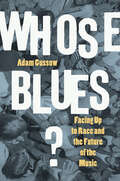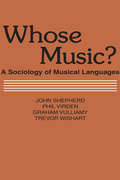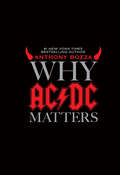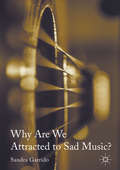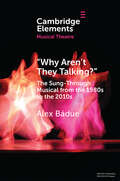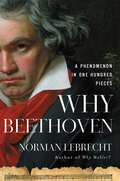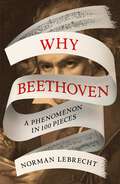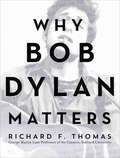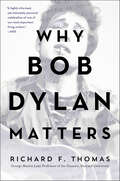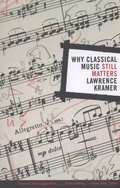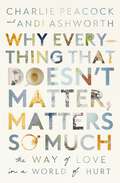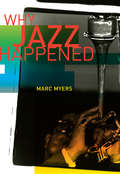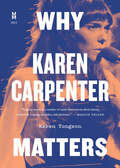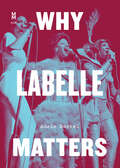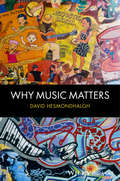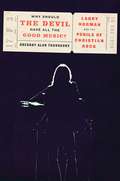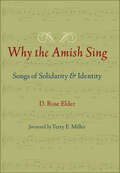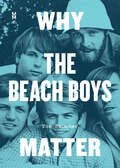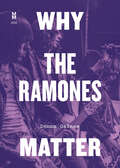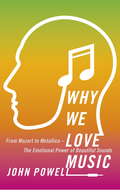- Table View
- List View
Whose Blues?: Facing Up to Race and the Future of the Music
by Adam GussowMamie Smith's pathbreaking 1920 recording of "Crazy Blues" set the pop music world on fire, inaugurating a new African American market for "race records." Not long after, such records also brought black blues performance to an expanding international audience. A century later, the mainstream blues world has transformed into a multicultural and transnational melting pot, taking the music far beyond the black southern world of its origins. But not everybody is happy about that. If there's "No black. No white. Just the blues," as one familiar meme suggests, why do some blues people hear such pronouncements as an aggressive attempt at cultural appropriation and an erasure of traumatic histories that lie deep in the heart of the music? Then again, if "blues is black music," as some performers and critics insist, what should we make of the vibrant global blues scene, with its all-comers mix of nationalities and ethnicities? In Whose Blues?, award-winning blues scholar and performer Adam Gussow confronts these challenging questions head-on. Using blues literature and history as a cultural anchor, Gussow defines, interprets, and makes sense of the blues for the new millennium. Drawing on the blues tradition's major writers including W. C. Handy, Langston Hughes, Zora Neale Hurston, and Amiri Baraka, and grounded in his first-person knowledge of the blues performance scene, Gussow's thought-provoking book kickstarts a long overdue conversation.
Whose Music?: Sociology of Musical Languages
by John ShepherdWhose Music? combines historical, musicological, and sociological materials and styles of analysis in ways that connect to the field of sociology. The analyses of social class systems presented here speak in translatable ways to analyses of musical forms. Not only that, both are connected to an understanding of the organizations through which works are distributed to their audiences. Perhaps most importantly for the contemporary reader, this book depicts the part of the process by which dominant class groups justify their domination--cultural and otherwise.
Why AC/DC Matters
by Anthony BozzaAustralian rock giants AC/DC have sold more records in the U.S. than Michael Jackson, Bruce Springsteen, Aerosmith, and than the Rolling Stones, yet have always been undervalued and unappreciated by mainstream rock music critics. In Why AC/DC Matters, former Rolling Stone staff writer and New York Times bestselling author Anthony Bozza addresses this inequity, penning a just tribute to these monsters of rock. Brimming with fascinating stories and insights from musicians, fans, music scholars, and the author himself, Why AC/DC Matters is an overdue homage to arguably the greatest rock and roll band of all time.
Why Are We Attracted to Sad Music?
by Sandra GarridoIn this book, perspectives in psychology, aesthetics, history and philosophy are drawn upon to survey the value given to sad music by human societies throughout history and today. Why do we love listening to music that makes us cry? This mystery has puzzled philosophers for centuries and tends to defy traditional models of emotions. Sandra Garrido presents empirical research that illuminates the psychological and contextual variables that influence our experience of sad music, its impact on our mood and mental health, and its usefulness in coping with heartbreak and grief. By means of real-life examples, this book uses applied music psychology to demonstrate the implications of recent research for the use of music in health-care and for wellbeing in everyday life.
“Why Aren't They Talking?”: The Sung-Through Musical from the 1980s to the 2010s (Elements in Musical Theatre)
by Alex BádueIn the American musical theater, the most typical form of structuring musicals has been the book musical, in which songs interrupt spoken dialogue and add means to depict characters and dramatic situations. After 1980, a form of structuring musicals that expands upon the aesthetic conventions of the book musical came to prominence. Sung-through musicals challenged the balance between talking and singing in musical theater in scripts that are entirely or nearly entirely sung. Although often associated with British musicals, this Element focuses on American sung-through musicals composed and premiered between 1980 and 2019. Their creative teams have employed specific procedures and compositional techniques through which music establishes characterization and expression when either very little or nothing is spoken and thus define how the musical reinvented itself toward and in the twenty-first century.
Why Beethoven: A Phenomenon in One Hundred Pieces
by Norman LebrechtWithout Beethoven, music as we know it wouldn&’t exist. By examining one hundred of his compositions, a portrait emerges of the man behind the music.Lebrecht has immersed himself in the rich catalog of Beethoven recordings and presents a unique picture of the man through his music. He selects the best recordings of one hundred key pieces, showing the composer as we&’ve never seen him before. Unruly, offensive, and hopeless in so much of his life, yet driven to a fault and devoted to his art, conquering deafness to pen masterpieces. Norman Lebrecht has been grappling with this icon at the heart of music for his entire life. Who was the irascible, unpredictable, warped genius who stretched what music could do to the breaking point? In this unique examination, Lebrecht attempts to understand the power of this man through his compositions, the history of who has performed them, and what it has meant to successive generations of audiences. In turn a detective story (we learn who Elise of &“Fur Elise&” is for the first time) and a confession, Why Beethoven aims to rise to the challenge of how to encompass the relentless energy of this singular genius. With a narrative that mirrors the wayward sequence of Beethoven&’s compositions, Beethoven emerges as a cornerstone of the world as we know it.
Why Beethoven: A Phenomenon in 100 Pieces
by Norman LebrechtWithout Beethoven, music as we know it wouldn&’t exist. Who was this titan of world culture? 'You want to build a Beethoven library? There can be no better starting point... Brilliant.' John Suchet, Classic FM presenter Through 100 recordings, Lebrecht brings to life the composer as we&’ve never seen him before. Unruly, offensive and hopeless in so much of his life, yes, but driven to a fault and devoted to his art, conquering deafness to compose some of the towering works of our culture. Along the way, we encounter the great musicians who have taken on the challenge of Beethoven, in all their glories and foibles. In this revealing, unique biography, Beethoven emerges as a cornerstone of the modern world. All recordings are freely available on Idagio and YouTube.
Why Bob Dylan Matters
by Richard F. Thomas“The coolest class on campus” – The New York TimesWhen the Nobel Prize for Literature was awarded to Bob Dylan in 2016, a debate raged. Some celebrated, while many others questioned the choice. How could the world’s most prestigious book prize be awarded to a famously cantankerous singer-songwriter who wouldn’t even deign to attend the medal ceremony?In Why Bob Dylan Matters, Harvard Professor Richard F. Thomas answers this question with magisterial erudition. A world expert on Classical poetry, Thomas was initially ridiculed by his colleagues for teaching a course on Bob Dylan alongside his traditional seminars on Homer, Virgil, and Ovid. Dylan’s Nobel Prize brought him vindication, and he immediately found himself thrust into the spotlight as a leading academic voice in all matters Dylanological. Today, through his wildly popular Dylan seminar—affectionately dubbed "Dylan 101"—Thomas is introducing a new generation of fans and scholars to the revered bard’s work. This witty, personal volume is a distillation of Thomas’s famous course, and makes a compelling case for moving Dylan out of the Rock & Roll Hall of Fame and into the pantheon of Classical poets. Asking us to reflect on the question, "What makes a classic?", Thomas offers an eloquent argument for Dylan’s modern relevance, while interpreting and decoding Dylan’s lyrics for readers. The most original and compelling volume on Dylan in decades, Why Bob Dylan Matters will illuminate Dylan’s work for the Dylan neophyte and the seasoned fanatic alike. You’ll never think about Bob Dylan in the same way again.
Why Bob Dylan Matters
by Richard F. Thomas“The coolest class on campus” – The New York TimesWhen the Nobel Prize for Literature was awarded to Bob Dylan in 2016, a debate raged. Some celebrated, while many others questioned the choice. How could the world’s most prestigious book prize be awarded to a famously cantankerous singer-songwriter who wouldn’t even deign to attend the medal ceremony?In Why Bob Dylan Matters, Harvard Professor Richard F. Thomas answers this question with magisterial erudition. A world expert on Classical poetry, Thomas was initially ridiculed by his colleagues for teaching a course on Bob Dylan alongside his traditional seminars on Homer, Virgil, and Ovid. Dylan’s Nobel Prize brought him vindication, and he immediately found himself thrust into the spotlight as a leading academic voice in all matters Dylanological. Today, through his wildly popular Dylan seminar—affectionately dubbed "Dylan 101"—Thomas is introducing a new generation of fans and scholars to the revered bard’s work. This witty, personal volume is a distillation of Thomas’s famous course, and makes a compelling case for moving Dylan out of the Rock & Roll Hall of Fame and into the pantheon of Classical poets. Asking us to reflect on the question, "What makes a classic?", Thomas offers an eloquent argument for Dylan’s modern relevance, while interpreting and decoding Dylan’s lyrics for readers. The most original and compelling volume on Dylan in decades, Why Bob Dylan Matters will illuminate Dylan’s work for the Dylan neophyte and the seasoned fanatic alike. You’ll never think about Bob Dylan in the same way again.
Why Classical Music Still Matters
by Lawrence Kramer"What can be done about the state of classical music?" Lawrence Kramer asks in this elegant, sharply observed, and beautifully written extended essay. Classical music, whose demise has been predicted for at least a decade, has always had its staunch advocates, but in today's media-saturated world there are real concerns about its viability. Why Classical Music Still Matters takes a forthright approach by engaging both skeptics and music lovers alike. In seven highly original chapters, Why Classical Music Still Matters affirms the value of classical music--defined as a body of nontheatrical music produced since the eighteenth century with the single aim of being listened to--by revealing what its values are: the specific beliefs, attitudes, and meanings that the music has supported in the past and which, Kramer believes, it can support in the future. Why Classical Music Still Matters also clears the air of old prejudices. Unlike other apologists, whose defense of the music often depends on arguments about the corrupting influence of popular culture, Kramer admits that classical music needs a broader, more up-to-date rationale. He succeeds in engaging the reader by putting into words music's complex relationship with individual human drives and larger social needs. In prose that is fresh, stimulating, and conversational, he explores the nature of subjectivity, the conquest of time and mortality, the harmonization of humanity and technology, the cultivation of attention, and the liberation of human energy.
Why Don't We: In the Limelight
by Why Don'T WeIn the Limelight is the official Why Don’t We autobiography, full of never-before-seen photos and behind-the-scenes info about one of today’s hottest bands.When five guys decided to form a band, they never imagined that they would go from playing music online to playing tours across the world so quickly. Why Don’t We has been together for less than two years, and they’ve already headlined sold out shows, played at Madison Square Garden, and amassed millions of fans. And this is all just the beginning.This is the official Why Don’t We story, full of never-before-seen photos and everything you need to know about Corbyn, Daniel, Zach, Jonah, and Jack. Find out the secrets they’ve never shared with fans before, their embarrassing childhood stories, what they look for in a girlfriend, and how it felt to have their lives completely changed by this incredible journey.
Why Everything That Doesn't Matter, Matters So Much: The Way of Love in a World of Hurt
by Andi Ashworth Charlie PeacockA hopeful and practical model for what it means to be a Christian and a culture-maker in a world of hurt and wondrous possibility, from multi–Grammy winner Charlie Peacock and his wife and author, Andi Ashworth.Do you feel powerless and overwhelmed by the pain and suffering all around you? Have you ever asked, What can I do to mend the world, my family, or my own life? And if I could, why bother? Does my own small part even matter? If so, here comes hope from two guides who are further down the road. Charlie and Andi have written a collection of letters to Christians and spiritual seekers who think deeply and care acutely about the state of the world and their personal spheres of influence.In Why Everything That Doesn't Matter, Matters So Much, beloved and trusted mentors, Charlie and Andi offer you:Thought-provoking explorations into the many facets of Christian culture care and making, from the kitchen to Carnegie Hall.Practical guidance for how to care for and improve the quality of human life, locally and globally, no matter your vocation.A theology of imagination and creativity that provides a framework for all of life.A model for expressing love in marriage, friendship, citizenship, and every kind of work—even in the midst of cynicism, fear, exhaustion, and oppression. It might be said of Christians that our lives are either moving in the direction of the redemption Jesus has on offer, or away from it. Each of these letters is a gentle nudge in the direction of God's powerfully ordinary purpose for each of us, no matter what the future holds, to participate fully in the beautiful, redemptive work of Christ.
Why Jazz Happened
by Marc MyersWhy Jazz Happened is the first comprehensive social history of jazz. It provides an intimate and compelling look at the many forces that shaped this most American of art forms and the many influences that gave rise to jazz's post-war styles. Rich with the voices of musicians, producers, promoters, and others on the scene during the decades following World War II, this book views jazz's evolution through the prism of technological advances, social transformations, changes in the law, economic trends, and much more. In an absorbing narrative enlivened by the commentary of key personalities, Marc Myers describes the myriad of events and trends that affected the music's evolution, among them, the American Federation of Musicians strike in the early 1940s, changes in radio and concert-promotion, the introduction of the long-playing record, the suburbanization of Los Angeles, the Civil Rights movement, the "British invasion" and the rise of electronic instruments. This groundbreaking book deepens our appreciation of this music by identifying many of the developments outside of jazz itself that contributed most to its texture, complexity, and growth.
Why Karen Carpenter Matters (Music Matters)
by Karen TongsonA Pitchfork Best Music Book of 2019: A look at what the beloved pop singer meant to fans, written with “nostalgic affection and astute critical thinking” (Los Angeles Times).In the ’60s and ’70s, America's music scene was marked by raucous excess, reflected in the tragic overdoses of young superstars such as Jimi Hendrix and Janis Joplin. At the same time, the uplifting harmonies and sunny lyrics that propelled Karen Carpenter and her brother, Richard, to international fame belied a different sort of tragedy—the underconsumption that led to Karen’s death at age thirty-two from the effects of an eating disorder.In Why Karen Carpenter Matters, Karen Tongson (whose Filipino musician parents named her after the pop icon) interweaves the story of the singer’s rise to fame with her own trans-Pacific journey between the Philippines—where imitations of American pop styles flourished—and Karen Carpenter’s home ground of Southern California. Tongson reveals why the Carpenters’ chart-topping, seemingly whitewashed musical fantasies of “normal love” can now have profound significance for her—as well as for other people of color, LGBT+ communities, and anyone outside the mainstream culture usually associated with Karen Carpenter’s legacy. This hybrid of memoir and biography excavates the destructive perfectionism at the root of the Carpenters’ sound, while finding the beauty in the singer’s all too brief life.
Why Karen Carpenter Matters (Music Matters)
by Karen TongsonA Pitchfork Best Music Book of 2019: A look at what the beloved pop singer meant to fans, written with “nostalgic affection and astute critical thinking” (Los Angeles Times).In the ’60s and ’70s, America's music scene was marked by raucous excess, reflected in the tragic overdoses of young superstars such as Jimi Hendrix and Janis Joplin. At the same time, the uplifting harmonies and sunny lyrics that propelled Karen Carpenter and her brother, Richard, to international fame belied a different sort of tragedy—the underconsumption that led to Karen’s death at age thirty-two from the effects of an eating disorder.In Why Karen Carpenter Matters, Karen Tongson (whose Filipino musician parents named her after the pop icon) interweaves the story of the singer’s rise to fame with her own trans-Pacific journey between the Philippines—where imitations of American pop styles flourished—and Karen Carpenter’s home ground of Southern California. Tongson reveals why the Carpenters’ chart-topping, seemingly whitewashed musical fantasies of “normal love” can now have profound significance for her—as well as for other people of color, LGBT+ communities, and anyone outside the mainstream culture usually associated with Karen Carpenter’s legacy. This hybrid of memoir and biography excavates the destructive perfectionism at the root of the Carpenters’ sound, while finding the beauty in the singer’s all too brief life.
Why Labelle Matters (Music Matters)
by Adele Bertei&“A smart, shrewd, joyful read, as piercing as any top C shriek from the woman who gave Labelle their name.&” —Barney Hoskyns, author of Glam! Bowie, Bolan, and the Glitter Rock Revolution Performing as the Bluebelles in the 1960s, Patti LaBelle, Nona Hendryx, and Sarah Dash wore bouffant wigs and chiffon dresses, and they harmonized vocals like many other girl groups of the era. After a decade on the Chitlin Circuit, however, they were ready to write their own material, change their name, and deliver—as Labelle—an electrifyingly celestial sound and styling that reached a crescendo with a legendary performance at the Metropolitan Opera House to celebrate the release of Nightbirds and its most well-known track, &“Lady Marmalade.&” In Why Labelle Matters, Adele Bertei tells the story of the group that sang the opening aria of Afrofuturism and proclaimed a new theology of musical liberation for women, people of color, and LGBTQ people across the globe. With sumptuous and galactic costumes, genre-bending lyrics, and stratospheric vocals, Labelle&’s out-of-this-world performances changed the course of pop music and made them the first Black group to grace the cover of Rolling Stone. Why Labelle Matters, informed by interviews with members of the group as well as Bertei&’s own experience as a groundbreaking musician, is the first cultural assessment of this transformative act.</
Why Labelle Matters (Music Matters)
by Adele Bertei&“A smart, shrewd, joyful read, as piercing as any top C shriek from the woman who gave Labelle their name.&” —Barney Hoskyns, author of Glam! Bowie, Bolan, and the Glitter Rock Revolution Performing as the Bluebelles in the 1960s, Patti LaBelle, Nona Hendryx, and Sarah Dash wore bouffant wigs and chiffon dresses, and they harmonized vocals like many other girl groups of the era. After a decade on the Chitlin Circuit, however, they were ready to write their own material, change their name, and deliver—as Labelle—an electrifyingly celestial sound and styling that reached a crescendo with a legendary performance at the Metropolitan Opera House to celebrate the release of Nightbirds and its most well-known track, &“Lady Marmalade.&” In Why Labelle Matters, Adele Bertei tells the story of the group that sang the opening aria of Afrofuturism and proclaimed a new theology of musical liberation for women, people of color, and LGBTQ people across the globe. With sumptuous and galactic costumes, genre-bending lyrics, and stratospheric vocals, Labelle&’s out-of-this-world performances changed the course of pop music and made them the first Black group to grace the cover of Rolling Stone. Why Labelle Matters, informed by interviews with members of the group as well as Bertei&’s own experience as a groundbreaking musician, is the first cultural assessment of this transformative act.
Why Music Matters
by David HesmondhalghListen to David Hesmondhalgh discuss the arguments at the core of 'Why Music Matters' with Laurie Taylor on BBC Radio 4's Thinking Allowed here.In what ways might music enrich the lives of people and of societies? What prevents it from doing so? Why Music Matters explores the role of music in our lives, and investigates the social and political significance of music in modern societies.First book of its kind to explore music through a variety of theories and approaches and unite these theories using one authoritative voiceCombines a broad yet theoretically sophisticated approach to music and society with real clarity and accessibilityA historically and sociologically informed understanding of music in relation to questions of social power and inequalityBy drawing on both popular and academic talk about a range of musical forms and practices, readers will engage with a wide musical terrain and a wealth of case studies
Why Should the Devil Have All the Good Music?: Larry Norman and the Perils of Christian Rock
by Gregory ThornburyThe riveting, untold story of the “Father of Christian Rock” and the conflicts that launched a billion-dollar industry at the dawn of America’s culture wars. In 1969, in Capitol Records' Hollywood studio, a blonde-haired troubadour named Larry Norman laid track for an album that would launch a new genre of music and one of the strangest, most interesting careers in modern rock. Having spent the bulk of the 1960s playing on bills with acts like the Who, Janis Joplin, and the Doors, Norman decided that he wanted to sing about the most countercultural subject of all: Jesus. Billboard called Norman “the most important songwriter since Paul Simon,” and his music would go on to inspire members of bands as diverse as U2, The Pixies, Guns ‘N Roses, and more. To a young generation of Christians who wanted a way to be different in the American cultural scene, Larry was a godsend—spinning songs about one’s eternal soul as deftly as he did ones critiquing consumerism, middle-class values, and the Vietnam War. To the religious establishment, however, he was a thorn in the side; and to secular music fans, he was an enigma, constantly offering up Jesus to problems they didn’t think were problems. Paul McCartney himself once told Larry, “You could be famous if you’d just drop the God stuff,” a statement that would foreshadow Norman’s ultimate demise. In Why Should the Devil Have all the Good Music?, Gregory Alan Thornbury draws on unparalleled access to Norman’s personal papers and archives to narrate the conflicts that defined the singer’s life, as he crisscrossed the developing fault lines between Evangelicals and mainstream American culture—friction that continues to this day. What emerges is a twisting, engrossing story about ambition, art, friendship, betrayal, and the turns one’s life can take when you believe God is on your side.
Why the Amish Sing: Songs of Solidarity and Identity (Young Center Books in Anabaptist and Pietist Studies)
by D. Rose ElderAn intimate portrait of the diverse music-making at the center of Amish faith and life.Singing occurs in nearly every setting of Amish life. It is a sanctioned pleasure that frames all Amish rituals and one that enlivens and sanctifies both routine and special events, from household chores, road trips by buggy, and family prayer to baptisms, youth group gatherings, weddings, and "single girl" sings. But because Amish worship is performed in private homes instead of public churches, few outsiders get the chance to hear Amish people sing. Amish music also remains largely unexplored in the field of ethnomusicology. In Why the Amish Sing, D. Rose Elder introduces readers to the ways that Amish music both reinforces and advances spiritual life, delving deep into the Ausbund, the oldest hymnal in continuous use. This illuminating ethnomusicological study demonstrates how Amish groups in Wayne and Holmes Counties, Ohio—the largest concentration of Amish in the world—sing to praise God and, at the same time, remind themselves of their 450-year history of devotion. Singing instructs Amish children in community ways and unites the group through common participation. As they sing in unison to the weighty words of their ancestors, the Amish confirm their love and support for the community. Their singing delineates their common journey—a journey that demands separation from the world and yielding to God's will.By making school visits, attending worship services and youth sings, and visiting private homes, Elder has been given the rare opportunity to listen to Amish singing in its natural social and familial context. She combines one-on-one interviews with detailed observations of how song provides a window into Amish cultural beliefs, values, and norms.
Why the Beach Boys Matter (Music Matters)
by Tom Smucker&“An excellent introduction to the band that might have evolved, [the author] suggests, into the Beatles.&” —New York Journal of Books Of all the white American pop music groups that hit the charts before the Beatles, only the Beach Boys continued to thrive throughout the British Invasion to survive into the 1970s and beyond. The Beach Boys helped define both sides of the era we broadly call the sixties, split between their early surf, car, and summer pop and their later hippie, counterculture, and ambitious rock. No other group can claim the Ronettes and the Four Seasons as early 1960s rivals; the Mamas and the Papas and Crosby, Stills and Nash as later 1960s rivals; and the Beatles and the Temptations as decade-spanning counterparts. This is the first book to take an honest look at the themes running through the Beach Boys&’ art and career as a whole and to examine where they sit inside our culture and politics—and why they still grab our attention.
Why the Beach Boys Matter (Music Matters)
by Tom Smucker“An excellent introduction to the band that might have evolved, [the author] suggests, into the Beatles.” ?New York Journal of BooksOf all the white American pop music groups that hit the charts before the Beatles, only the Beach Boys continued to thrive throughout the British Invasion to survive into the 1970s and beyond. The Beach Boys helped define both sides of the era we broadly call the sixties, split between their early surf, car, and summer pop and their later hippie, counterculture, and ambitious rock. No other group can claim the Ronettes and the Four Seasons as early 1960s rivals; the Mamas and the Papas and Crosby, Stills and Nash as later 1960s rivals; and the Beatles and the Temptations as decade-spanning counterparts.This is the first book to take an honest look at the themes running through the Beach Boys’ art and career as a whole and to examine where they sit inside our culture and politics—and why they still grab our attention.
Why the Ramones Matter (Music Matters)
by Donna Gaines&“Unequivocally fresh and engrossing. Even the biggest fans will find something new to enjoy here.&” ―Razorcake The central experience of the Ramones and their music is of being an outsider, an outcast, a person who&’s somehow defective, and the revolt against shame and self-loathing. The fans, argues Donna Gaines, got it right away, from their own experience of alienation at home, at school, on the streets, and from themselves. This sense of estrangement and marginality permeates everything the Ramones still offer us as artists, and as people. Why the Ramones Matter compellingly makes the case that the Ramones gave us everything; they saved rock and roll, modeled DIY ethics, and addressed our deepest collective traumas, from the personal to the historical.
Why the Ramones Matter (Music Matters)
by Donna Gaines&“Unequivocally fresh and engrossing. Even the biggest fans will find something new to enjoy here.&” ―Razorcake The central experience of the Ramones and their music is of being an outsider, an outcast, a person who&’s somehow defective, and the revolt against shame and self-loathing. The fans, argues Donna Gaines, got it right away, from their own experience of alienation at home, at school, on the streets, and from themselves. This sense of estrangement and marginality permeates everything the Ramones still offer us as artists, and as people. Why the Ramones Matter compellingly makes the case that the Ramones gave us everything; they saved rock and roll, modeled DIY ethics, and addressed our deepest collective traumas, from the personal to the historical.
Why We Love Music: From Mozart to Metallica - The Emotional Power of Beautiful Sounds
by Dr John PowellDid you know that . . .carrying a musical instrument makes you more attractive?music can cure insomnia?music can change the taste of wine?the Mozart effect has nothing to do with Mozart?Barry Manilow songs can be used for crowd control?Why does music affect you so profoundly? It impacts the way you think, talk, feel, behave and even spend money. With his conversational style, humour, and endless knowledge, scientist and musician John Powell showcases fascinating studies - for example that shoppers spend more money in stores that play classical music and, even more astounding, they are more likely to buy German wine in stores playing German music. With chapters on music and emotions, music as medicine, music and intelligence, and much more, Why We Love Music will entertain through to the very last page. A delightful journey through the psychology and science of music, Why We Love Music is the perfect book for anyone who loves a tune.
